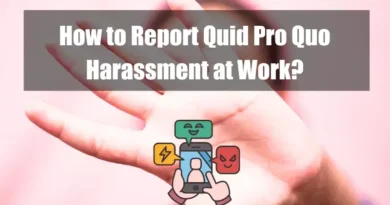Quid Pro Quo Harassment in the Military
Takeaways
| Key Points |
|---|
| Quid pro quo harassment in the military involves situations where someone in a position of power—like a supervisor—demands sexual favors in exchange for professional benefits or to avoid negative consequences. This type of harassment can include requests for sexual acts in return for promotions, favorable assignments, or other workplace advantages. |
| The military has strict regulations against such behavior under the Uniform Code of Military Justice (UCMJ), and offenders can face serious consequences, including involuntary separation from service. |
| The Army’s SHARP (Sexual Harassment/Assault Response and Prevention) program emphasizes creating a respectful environment, with policies in place to investigate complaints and protect victims from retaliation. |
| Reforms have also strengthened the processes for holding perpetrators accountable, especially following high-profile cases such as the one involving SPC Vanessa Guillen, where leadership failed to act on harassment complaints. |
Introduction
Quid pro quo harassment in the military is a severe issue that affects both men and women, although women are disproportionately impacted. It refers to situations where a person in a position of authority, such as a superior officer, demands sexual favors in exchange for career advancements, favorable job assignments, or other workplace benefits.
This form of harassment creates an intimidating and unequal working environment, violating military regulations and eroding trust within the ranks. Addressing quid pro quo harassment is critical for maintaining discipline, morale, and equality within the armed forces.
Definition of Quid Pro Quo Harassment
The term “quid pro quo” is Latin for “this for that.” In the context of sexual harassment, it involves a direct exchange: the perpetrator offers or threatens career-related benefits or detriments based on the victim’s compliance with or refusal of sexual advances. In the military, this could mean a superior officer promising promotions, better work assignments, or favorable treatment in exchange for sexual favors. Conversely, failure to comply may lead to punishments, such as undesirable postings or demotion.
Quid pro quo harassment differs from hostile work environment harassment, which involves persistent, pervasive behavior that creates an offensive or intimidating work environment. Quid pro quo harassment can involve a single or repeated incident, often tied explicitly to a person’s career advancement or work conditions.
Prevalence of Sexual Harassment in the Military
According to RAND, about 20,300 out of 1.3 million active service members were sexually assaulted in the past year. Around 1% of men and 4.9% of women reported being assaulted, which is roughly 10,600 men and 9,600 women (the total doesn’t add up exactly because of rounding). Among those assaults, 43% of women and 35% of men experienced more severe assaults involving penetration. Most of the assaults (90%) happened in military settings or were committed by other military personnel.
Legal Framework and Military Regulations
The U.S. military has strict regulations to address sexual harassment, including quid pro quo harassment.
The Uniform Code of Military Justice (UCMJ) provides a legal framework for addressing criminal behavior, including sexual harassment and assault. Article 134 of the UCMJ addresses actions that bring discredit to the armed forces, which may include sexual harassment under certain conditions. In cases involving quid pro quo harassment, prosecution can occur under Article 93 of the UCMJ, which covers cruelty, oppression, or maltreatment by a superior toward a subordinate.
In addition to the UCMJ, each military branch has specific policies and programs to prevent and address sexual harassment. These include mandatory training programs, complaint procedures, and support systems for victims. However, despite these measures, implementing these policies effectively is often challenging, particularly when it comes to prosecuting offenders or providing adequate protection for victims.
Reporting and Response Systems
Military personnel can report quid pro quo harassment through several channels, including their chain of command, equal opportunity offices, or through sexual assault response coordinators (SARCs). However, many service members are reluctant to report incidents due to fear of retaliation, lack of trust in the system, or concern about damaging their careers. This has led to underreporting, which makes it difficult to understand the scope of the problem fully.
In recent years, efforts have been made to improve the reporting process and support for victims. Programs like the Sexual Assault Prevention and Response (SAPR) office and initiatives led by the Department of Defense have focused on creating a more transparent and supportive environment for those affected by sexual harassment and assault, but challenges persist.
Challenges in Addressing Quid Pro Quo Harassment in the Military
Despite policies and regulations, addressing quid pro quo harassment in the military faces several challenges.
The military’s hierarchical structure often complicates reporting, as victims may feel that their complaints will not be taken seriously or will face retaliation from their superiors. Additionally, the close-knit nature of military units can create a culture of silence, where service members are reluctant to speak out against their peers or superiors.
Furthermore, the military justice system has been criticized for its handling of sexual harassment cases, with some arguing that it does not provide adequate protection or justice for victims.
Investigations can be slow, and the outcomes are not always favorable to the victim. These challenges highlight the need for continued reform and oversight to ensure that all service members are protected from harassment and can report incidents without fear of retaliation.
Conclusion
Quid pro quo harassment in the military remains a critical issue that undermines the integrity and morale of the armed forces. While there have been significant efforts to address this form of harassment, including legal reforms and the establishment of support systems for victims, challenges persist. The military must continue to improve its response to quid pro quo harassment by promoting transparency, accountability, and a culture that encourages reporting without fear of retaliation.
As the military works to address these issues, it must focus on providing comprehensive support for victims, holding perpetrators accountable, and fostering an environment where all service members are treated with dignity and respect. The fight against quid pro quo harassment is essential to ensuring the well-being of those who serve and maintaining the trust and cohesion necessary for the effective functioning of the U.S. military.
FAQ
What is “Quid Pro Quo” in the context of military sexual harassment?
Quid Pro Quo” is a Latin term meaning “this for that.” In military sexual harassment cases, it refers to situations where a superior offers or withholds job benefits, promotions, or other favorable actions in exchange for sexual favors.
How does the Uniform Code of Military Justice (UCMJ) address quid pro quo harassment?
The UCMJ criminalizes sexual harassment under Article 134, which encompasses conduct prejudicial to good order and discipline. Quid pro quo harassment, where a superior demands sexual favors in exchange for career benefits, falls under this provision.
What constitutes “unwelcome sexual advances” in quid pro quo harassment cases?
“Unwelcome sexual advances” are unsolicited and undesired behaviors of a sexual nature that a recipient finds objectionable. Even if a service member consents under pressure in the military, the advances are considered unwelcome if they were not freely invited or desired.
What does “tangible employment action” mean in the context of quid pro quo harassment?
A “tangible employment action” involves a significant change in employment status or benefits, such as promotion, demotion, reassignment, or termination. In quid pro quo harassment, such actions are contingent upon accepting or rejecting sexual advances.
How is “abuse of authority” defined in military quid pro quo harassment cases?
“Abuse of authority” occurs when someone in a position of power misuses their rank or position to solicit sexual favors, implying that compliance is necessary for career progression or to avoid adverse consequences.
What does “consent” imply in situations involving quid pro quo harassment?
In the military, “consent” must be given freely and voluntarily. When a subordinate agrees to sexual advances due to fear of negative repercussions or in the hope of career benefits, such consent is not considered valid, as it is obtained under duress.
What is the role of a “superior-subordinate relationship” in quid pro quo harassment?
A “superior-subordinate relationship” involves a hierarchical dynamic where the superior has authority over the subordinate. In quid pro quo harassment, this power imbalance is exploited to solicit sexual favors, making the subordinate feel compelled to comply.
How does “retaliation” relate to quid pro quo harassment in the military?
“Retaliation” refers to adverse actions taken against an individual for refusing sexual advances or for reporting harassment. This can include demotion, unfavorable assignments, or other punitive measures and is prohibited under military regulations.
What is a “hostile work environment,” and how does it differ from quid pro quo harassment?
A “hostile work environment” arises when unwelcome sexual conduct unreasonably interferes with an individual’s work performance or creates an intimidating or offensive atmosphere. Unlike quid pro quo harassment, it doesn’t involve explicit exchanges but pervasive inappropriate behavior.
What does “zero-tolerance policy” mean concerning quid pro quo harassment?
A “zero-tolerance policy” signifies that any instance of quid pro quo harassment is met with immediate and strict disciplinary action, regardless of the perpetrator’s rank or position, underscoring the military’s commitment to eradicating such behavior.
How is “sexual favoritism” relevant to quid pro quo harassment cases?
“Sexual favoritism” occurs when individuals who submit to sexual advances receive preferential treatment, leading to perceptions of unfairness and discrimination among other service members. This undermines morale and unit cohesion.
What is the significance of “command climate” in preventing quid pro quo harassment?
“Command climate” refers to a military unit’s prevailing culture and environment. A positive command climate, fostered by leadership is crucial in preventing quid pro quo harassment by promoting respect and accountability.
How does “implied threat” function in quid pro quo harassment scenarios?
An “implied threat” involves indirect suggestions that negative consequences will follow if sexual advances are refused. In the military, such threats exploit the hierarchical structure, pressuring subordinates to comply to avoid potential repercussions.
What role does the “reporting chain” play in addressing quid pro quo harassment?
The “reporting chain” is the established hierarchy through which service members report issues. In quid pro quo harassment cases, reporting within the chain can be challenging, especially if the harasser is within that chain, necessitating alternative reporting mechanisms.
What are “protective measures” available for victims of quid pro quo harassment in the military?
“Protective measures” include actions such as reassignment of the alleged harasser, granting leave to the victim, or providing counseling services. These measures aim to safeguard the victim’s well-being during the investigation and adjudication process.










Comments are closed.